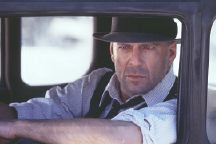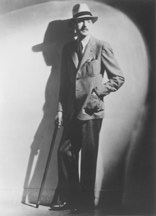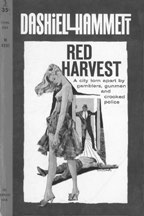Last Movie Standing
Where There's a Willis, There's a Way: In "Last Man Standing," a mysterious stranger (Bruce Willis) sells his services to both sides in a war of gangsters.
Is Walter Hill's 'Last Man Standing' a remake of Akira Kurosawa's 'Yojimbo' or the long-awaited adaptation of Dashiell Hammett's novel 'Red Harvest'? Only the lawyers know for sure.
By Allen Barra
A MYSTERIOUS stranger arrives in a town split between two corrupt factions. There is no outside authority to restrain them; the only law and order comes from the balance between the warring camps. The stranger sells himself to both sides, playing the ends against the middle. When the dust settles, he's the last man standing.
Which in fact is the title of the new Prohibition-era gangster film written and directed by Walter Hill and starring Bruce Willis as the man in the middle. But movie audiences already know the story; it's the same basic plot as Japanese director Akira Kurosawa's classic samurai film Yojimbo, starring Toshiro Mifune and released in the U.S. 35 years ago. Readers of hard-boiled fiction, however, might recall an even older source: Dashiell Hammett's 1929 novel Red Harvest, about a nameless detective in a gangster-ruled town. With such a tangle of influences, it's no surprise that the story has drawn the attention of lawyers as well as filmmakers.
Richard von Busack's review of the movie Last Man Standing.
For those who missed Yojimbo, the plot resurfaced in Sergio Leone's 1964 spaghetti Western A Fistful of Dollars. Purists even consider the third Mad Max film, Beyond Thunderdome, a disguised version of the tale--especially the sequence in which Mel Gibson's Max wanders into Bartertown. Some film fans believe that director George Miller's postapocalyptic Asian costumes were a homage to Kurosawa; the reference to Max as "The man with no name" is clearly a nod to Eastwood's gunfighter in Leone's film.
Yojimbo's influence has even spilled over to the most pop of pop-culture flicks. In The Bodyguard, Kevin Costner watches a screening of Kurosawa's film and later does some samurai-ish turns with a sword (Yojimbo, loosely translated, is Japanese for "bodyguard").
East Meets West
THE FILMS of Akira Kurosawa have always been a point at which Eastern and Western currents crossed. His Throne of Blood (1957) retold Macbeth, and Ran (1985) resembled King Lear. And Kurosawa hasn't borrowed only from high art. His thriller High and Low (1963) was an adaptation of 87th-precinct creator Ed McBain's novel King's Ransom.
Western filmmakers have returned the compliment, if it can be considered such. Kurosawa's The Seven Samurai (1954) was turned into the 1960 Western hit The Magnificent Seven, and Rashomon (1950) was clumsily translated into Martin Ritt's The Outrage (1964).
Although Kurosawa's borrowings from Shakespeare and McBain were acknowledged, The Magnificent Seven and The Outrage were made without the master's approval or even his knowledge. Kurosawa apparently reached his limit with A Fistful of Dollars and sued in an Italian court. Leone, incredibly, denied the connection between his film and Yojimbo, even though numerous critics have pointed out the similarities not only in plot but in shot selection and camera angles.
After the suit dragged on for years, Kurosawa finally received a portion of the profits from A Fistful of Dollars and the copyrights to Yojimbo, while United Artists, Leone's distributor, retained copyrights to A Fistful of Dollars.
Since the plots of the two films are nearly identical, the court's ruling resulted in more ambiguity than justice. In the case of Last Man Standing, there will probably be no question that New Line Cinema, the film's distributor, has the right to revise Yojimbo. In fact, director Hill, who calls the film "an adaptation, not a remake," is proud of the fact that Last Man Standing will be the first version of a Kurosawa film sanctioned by the Japanese filmmaker.
That pedigree, however, didn't stop United Artists from trying to muscle in on the action. "When the project was announced," says a New Line spokesman, "a story in the press said, 'It is widely known that Yojimbo was remade in 1964 as A Fistful of Dollars.' Somebody must have read that, because we got a letter from UA that said, in effect, 'You are now on legal notice that you have no right to use the plot of A Fistful of Dollars.' It was bizarre. Their attitude was like Yojimbo had never been made, let alone made first. We decided to ignore the letter and make our movie."
The Hammett Link
PERHAPS EVEN more bizarre, however, was another letter New Line received, from Grimaldi Productions. While no one at New Line will disclose the precise contents, "it was a warning," says one New Line source, "telling us that we did not have the right to film a version of Red Harvest without dealing with them."
Maurizio Grimaldi, whose father, Alberto, owns the film rights to Dashiell Hammett's legendary novel, claims that Yojimbo "practically is Red Harvest--it's a samurai version of an American gangster novel. Many people have said this." To redo Yojimbo in an American gangster setting without acknowledging Red Harvest is, in Grimaldi's words, "borderline dishonest."
Whether or not Grimaldi is correct, he's far from the first to see a connection between the Great American Gangster Novel and the Great Japanese Samurai Film. For decades, American film critics such as Manny Farber and Andrew Sarris have assumed that Yojimbo was, in fact, an uncredited version of Red Harvest--"a bowdlerized version," wrote Farber in an oft-quoted 1966 essay, "The Decline of the Actor." In The Samurai Films of Akira Kurosawa, David Desser states categorically that Yojimbo "is an adaptation of Dashiell Hammett's Red Harvest" and that "the basic situation that motivates the plot in Yojimbo is adapted from Hammett's Red Harvest."
If Yojimbo is the film every director wants to remake, Red Harvest is the novel every director wants to adapt. Hammett's first novel, Red Harvest is the story of a detective, known only as "The Continental Op," who foments trouble in a Western mining town called "Personville," soon renamed "Poisonville" because of the duplicitous mine owners, union leaders and police who populate it.
Apparently taking his cue from the traditional Western motif of the loner who rides into town and cleans up, Hammett gave the premise a uniquely 20th-century flavor that some critics called a Marxist assault on capitalism. Instead of one man leading a triumph of good versus evil, the Continental Op plays the part of a catalyst who causes evil to fight evil until virtually all the major characters have eliminated themselves.
Hammett thought Red Harvest his best novel; so did highbrow critics. Robert Graves called it "a literary landmark," and Andre Gide dubbed it "the last word in atrocity, cynicism, and horror" (one assumes Gide meant it as compliment).
Contrary to popular opinion, Red Harvest was filmed--sort of. Paramount gave Ben Hecht the assignment, and the result, released in 1930, was Roadhouse Nights, a film so stripped of the violence and politics of Hammett's original that it's remembered today, if at all, as the screen debut of Jimmy Durante.
By the time Hammett's The Maltese Falcon, The Thin Man and The Glass Key had become film successes, Hammett himself was in trouble with the House Un-American Activities Committee, eventually doing jail time for refusing to name names. Squeezed by the government for back taxes, Hammett lost his copyrights to the IRS. Anyone who wanted to acquire film rights to Red Harvest or any other Hammett book had to deal with the IRS until Lillian Hellman, Hammett's longtime lover and companion, managed to obtain the rights after Hammett's death in 1961.
The most publicized attempt to bring Red Harvest to the screen involved director Bernardo Bertolucci, who, even with Jack Nicholson and Debra Winger, couldn't overcome a series of financial screen failures and obtain backing.
Recently David Lynch and novelist Barry Gifford (Wild at Heart) were approached about a Red Harvest project. Gifford points out that Red Harvest has been covered once already in this decade. "The Coen brothers' Miller's Crossing, a 1992 gangster film about Irish and Italian mobs, is essentially Red Harvest spliced with the big-city politics from Hammett's The Glass Key," Gifford says. "It's obvious to anyone who's read the books." (The Coens' first film, Blood Simple, took its title from a line in Red Harvest.)
Samurai Gangster
BUT IS Yojimbo, finally, a "version" of Red Harvest? Kurosawa, who is currently working on a film, has declined to comment, though he once told an interviewer, "The idea [for Yojimbo] is about rivalry on both sides, and both sides are equally bad. The story is so ideally interesting that it's surprising no one else ever thought of it."
Donald Richie, who has written on Kurosawa's work for decades, doesn't believe Yojimbo was derived from Red Harvest. "I think the similarity in themes is just coincidence," says Richie. "Kurosawa has always acknowledged his sources." (In his chapter on Yojimbo in the recently issued third edition of The Films of Akira Kurosawa, Richie does not even mention Red Harvest.)
But a former colleague of Kurosawa's isn't sure. "Akira made a film called The Quiet Duel, which owes a great deal to Tolstoy's The Death of Ivan Ilych," says the source. "He could easily have done the same with Hammett's novel."
"I don't think any honest person could make a '20s gangster film and not acknowledge a debt to Hammett," Hill says, "and when I finished a draft of the screenplay, I remember thinking, 'Damn, this almost reads like Hammett.' But to tell you the truth, I was as much inspired by the works of James M. Cain. But I don't think Akira Kurosawa's film is anything but his own. Borges once said that all fiction was either a telling of the Odyssey or the Crucifixion. Now, go sue all the people who've used those themes."
[ Metro | Metroactive Central | Archives ]
This page was designed and created by the Boulevards team.

Ralph Nelson![[line]](/gifs/line.gif)
![[line]](/gifs/line.gif)

Poisonville Pen: Dashiell Hammett's "Red Harvest" reads like a fistful of "Yojimbo." Since then, Red Harvest has become the Moby Dick of film adaptations. In 1973, Alberto Grimaldi, who had produced the two sequels to A Fistful of Dollars, purchased the film rights. James Bridges worked on a screenplay and was scheduled to direct, but the project was shelved when he died in 1975.
Since then, Red Harvest has become the Moby Dick of film adaptations. In 1973, Alberto Grimaldi, who had produced the two sequels to A Fistful of Dollars, purchased the film rights. James Bridges worked on a screenplay and was scheduled to direct, but the project was shelved when he died in 1975.
From the September 26-October 2, 1996 issue of Metro
![[Metroactive Movies]](/movies/gifs/ma-movies.gif)